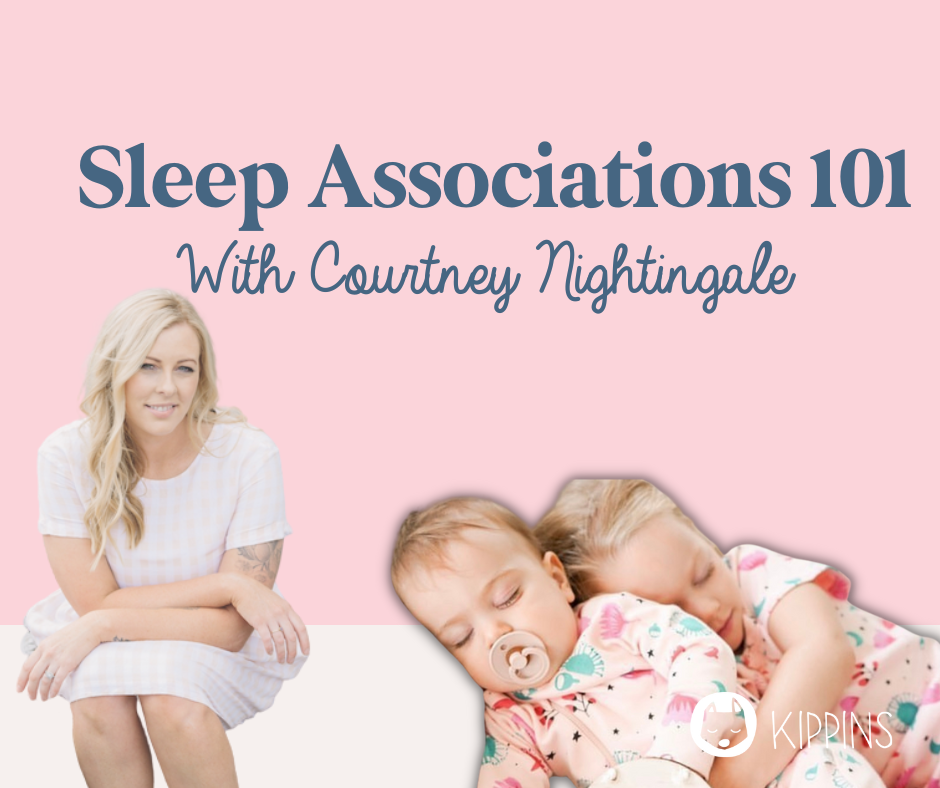Sleep Associations 101. What are they and how do they affect your child's sleep?

You've probably heard the term 'Sleep Associations', but how does it fit in with the world of baby sleep and more importantly, how can it help us all get more sleep? The lovely (and super talented) Courtney Nightingale from The Parenting Edit is a sleep and behavioural expert who breaks down everything you need to know about sleep associations.
Take it away, Courtney!
Courtney: Alright, we know there is a lot of fuss around this Sleep Associations business so I’m here to give you what you need to know, without the fluff, so you can find a sustainable sleep situation in your home, whatever you want that to look like!
We all have Sleep Associations.
Everyone. Yes you. Yes me. Yes, even Grandma has some kind of sleep association.
This might be a particular pillow you need, a certain position you lie in, the type of clothing you wear, how much light/dark there is, even the type of mattress you sleep on.
We all have things we like and need, that help us prepare and settle to sleep.
For me, I have to have 2 pillows and the room has to be dark (hotel stays come with a 10-minute run around covering all the LED lights in sight) and my husband needs to be quiet (snoring is not an option haha)
It’s no biggie, right?
Well, let’s cover some Sleep Associations your little one might have.
Essentially, we can divide them into two camps. Some refer to them as positive or negative, others refer to them as independent or dependent. Me? I refer to them as things that are working for you, and things that may not be working for you – so where they fit is entirely up to you in the age/stage you are in.
But for the sake of clarifying which Sleep Associations will encourage more independent sleep vs not-so-independent, we shall just use Independent and Dependent.
Some examples of Dependent Sleep Associations are:
- Feeding to sleep
- Rocking to sleep
- Holding to sleep
- Motion to sleep like a pram, car, baby carrier
- Replacing a dummy frequently
- Blankets – that need replacing when being kicked off
- Parental presence – parents can’t leave the room
- Patting/tapping to sleep
- Bouncing on a fitball
Some example of Independent Sleep Associations are:
- Wind-Down Rituals
- Sleeping bags or Swaddles
- White Noise
- Lovies/Comforters
- Dummies – when your little one can find and replace it themselves!
- Thumb/hand sucking
The great thing about these is that they are portable! Yay! Take them with you wherever your baby is going to take a sleep – boom, sleep environment has been re-created!
How do Sleep Associations impact sleep?
Well, if your little one is relying on associations such as feeding, rocking or holding, we tend to see baby waking more frequently as they begin to rely those same conditions being restored in order to be able to link sleep cycles, or even just settle to sleep initially.
At around four-months-old your little one’s sleep becomes more adult-like making the wakefulness between sleep cycles very evident. During this time sleep associations begin to play a fairly big part in the way your baby falls asleep, and whether they stay asleep.
From this stage, you can begin to learn how to settle and re-settle in increasing independence. Prior to this, your baby is not neurologically capable so it’s very important to drop any expectation that sleep will be easily achieved every single time.
A lot does come down to temperament for sure, some babies are just great sleeper, others need all of the pieces of the puzzle in the right place in order for sleep to happen calmly and happily.
Sleep Associations and the brain.
In a nutshell, neurons that fire together, wire together! Over time and with reinforcement your little tot creates a neural pathway in the brain that will contribute to difficulties with consolidating sleep, both during the day and overnight.
There are many steps to take towards this self-settling ability. While this is a skill you baby is born with, it does take time and practice.
The image below/beside/left/right represents all the ways your baby can settle off to sleep. There is no right or wrong, there is no race, there is no better or best. It is just about what is sustainable and what feels-good for you and your family.

This image is a visual tool to explain how you can begin to support the development of self-settling over time, moving up the ladder.
Some babies naturally become less dependent over time, but for the most part dependent sleep associations need to be gradually faded for real change to stick. This is a life-long skill that absolutely benefits the family as a whole.
Oh, and there is one more really important point to make! If you have fed, changed and burped your baby and they are due for a sleep, if all is calm this is a great chance to place them in their sleep space to explore the idea of drifting off to sleep. You never know, your babe might just surprise the heck out of you!
Self-Settling and Self-Soothing – what’s the difference?
In the simplest of terms, self-settling is just going from an awake state to an asleep state without someone doing it for you. This is a normal body process that we are born with.
Self-soothing is entirely different, this is about regulating emotions and this skill doesn’t begin to develop until 6-months-old. BUT, this doesn’t mean that our babies and toddlers can do this by themselves all the time.
Learning new things takes time and practice, of course there will be frustration and emotions that come up. We are allowed to feel our feelings, we learn that they come and they go. They don’t need to be stifled and stopped as soon as they begin; the important part is that we are there to soothe and support this new learning.
You don’t have to dive all in, you can do this by providing little opportunities here and there to practice the skill of falling to sleep.
It’s not just about Self-Settling though!
I cannot stress highly enough that self-settling is just ONE piece of a very large puzzle! If you have been working on self-settling alone, having no luck over weeks or months… then SOMETHING IS MISSING!
Learning to self-settle should be a fairly short-lived process OR you should be seeing continual progress – this fully depends on the approach you are taking. If this isn’t the case, then you probably need an assessment so the gaps can be plugged.
Sleep is a science, like I said earlier, some babies just need all the pieces so it can settle into place.
Now, this doesn’t mean that you will never again need to rock, hold or assist your baby to sleep! There will be illness, developmental leaps or nightmares to navigate, just to name a few. There will be plenty of times your little one will need you as they grow.
The difference is that, if most of the time they are able to get themselves to sleep and re-settle between sleep cycles, the times where they do need some support, won’t throw the whole thing into the wind again! Your tot has figured out that they have got this and that sleep isn’t so hard after all.
Parents! Courtney offers a FREE Newborn Masterclass - sign up here.
About Courtney Nightingale from The Parenting Edit (www.theparentingedit.co)
Hey parents!
I’m Courtney, child-wrangler, sometimes parent-wrangler, sleep & behavioural specialist, and instigator of The Parenting Edit.
And helping stressed and exhausted parents get their parenting swagger back? I live for it.
With a family-first approach, I take what you give me and work with it to get your family back to sleep. You’re guaranteed to feel supported and heard during our time together.
A mum of 2 ratbags, wife and business owner, I’ve been working with families for 10+ years in education and sleep/ behavioural roles. With a Bachelor in Education and a Post-Grad Diploma in Special Education, I’m experienced in working with kids with a diagnosis and enjoy troubleshooting toughies with parents.
Watching families go from tired and confused to confident in their parenting decisions, refreshed and back to being their non-sleep deprived-selves lights me the heck up. Embracing the real and raw side of parenting, I’ll make sure we have plenty of laughs along the way.
Let me know what you’re struggling with and let’s book you in so you and your fam can finally catch some zZz’s.

